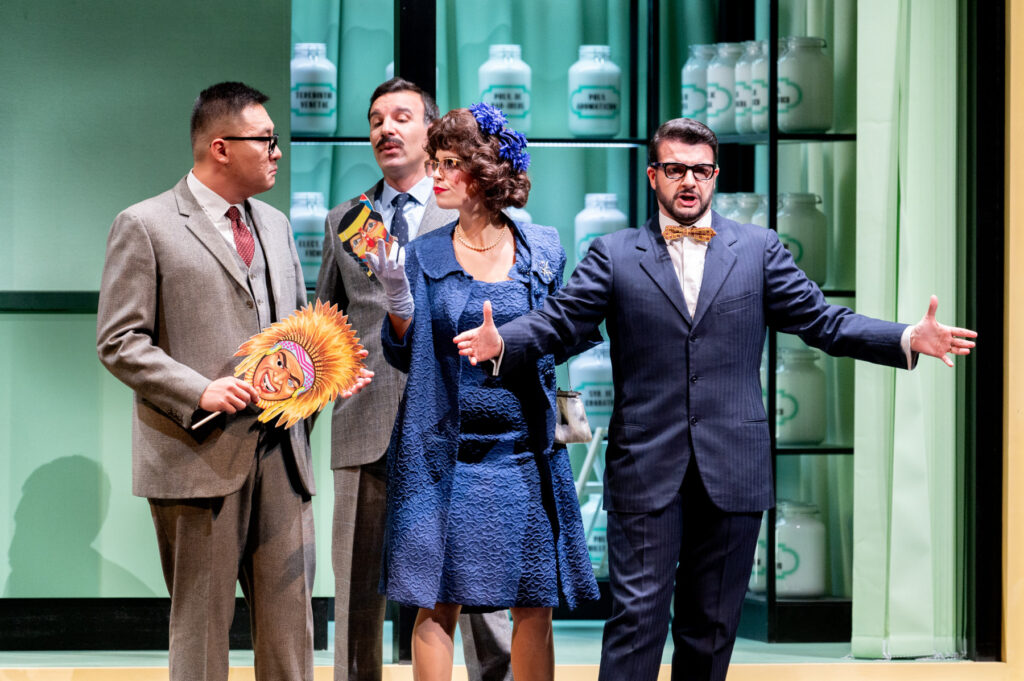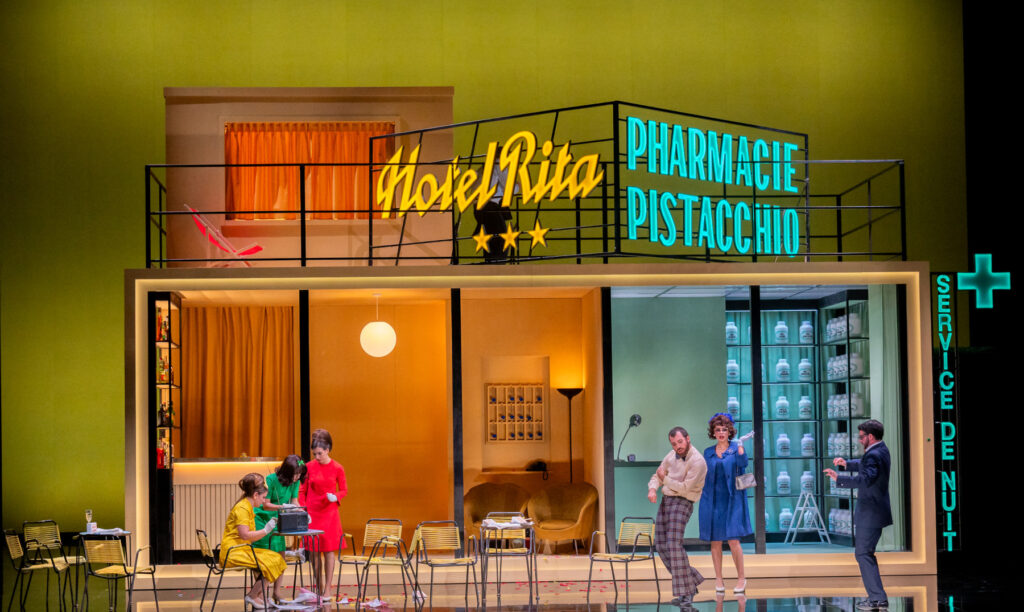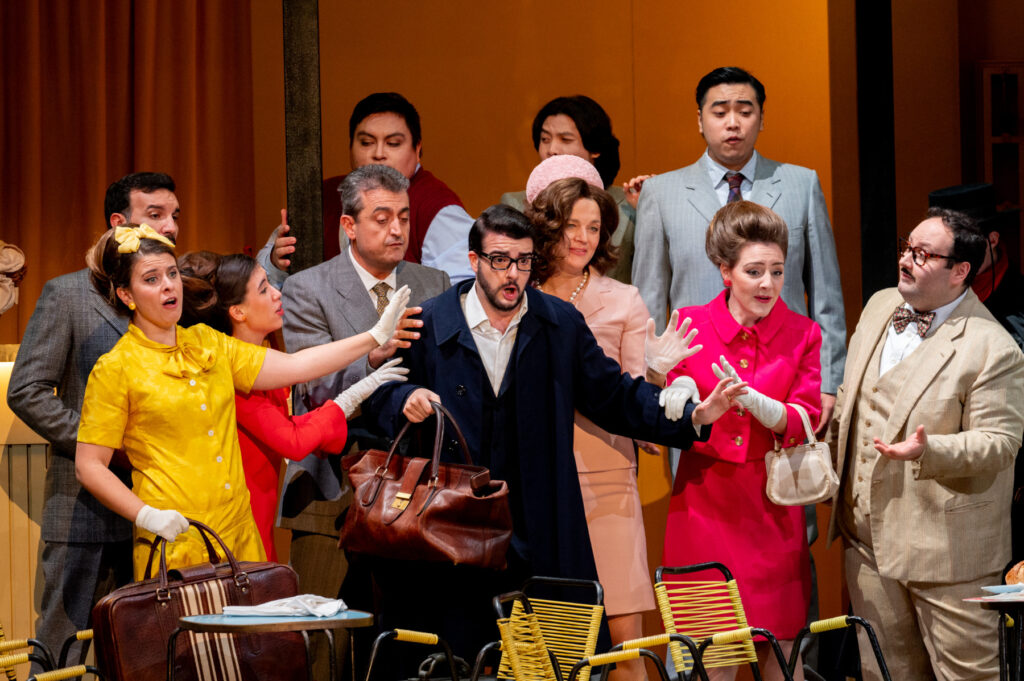The two one act comic operas in this double bill were written as entirely separate works, in 1836 and 1841 respectively. But Stefania Bonfadelli pairs them brilliantly as two sides of the same matrimonial coin, and looking particularly at the man’s lot within the relevant spousal relationships. The present wave of feminist thinking has rightly yielded the opportunity to appraise the patriarchal assumptions of much of the operatic repertory. It’s welcome, then, for a fresh perspective to be offered on the male side of marriage from the generally sympathetic point of view of a female director.
Deux hommes et une femme here is probably better known to audiences as Rita, but is presented here in Donizetti’s original French version, as far as can be gleaned from the original manuscript. It was written for an intended performance at Paris which didn’t materialise, and never appeared in the composer’s lifetime. Its first performance in 1860 was given in a posthumous revision that ironed out some of the work’s sharper wit and cynicism in favour of a gentler, more sentimental conclusion. But the original text wasn’t restored to general circulation until a critical edition of the score was published in 2008.

The comic scenario, and much of the libretto, subverts many of the standard conventions of romantic opera. Rita’s first husband, Gasparo, ran away years ago to Canada, and was assumed to have drowned. He returns to Italy to obtain Rita’s death certificate, believing that she had died in a fire, so that he can remarry, but discovers that she is actually alive and remarried, to Pepé. Having been mistreated by Gasparo, Rita has learned to hold her own by browbeating the more submissive Pepé. When the latter discovers Gasparo’s identity, he’s only too pleased to find a way out of his relationship with the abusive Rita and escape the inn which she runs, given that her and Gasparo’s marriage would still be valid. A series of ruses follow in which the two men each seek to leave the other as the only legal husband, through variously ironically ungallant or feigned romantic gestures to get what they want. A proposed duel brings matters to a head, and the cowardly Pepé decides that he’d rather put up with Rita than risk death, and so they reach an accord, and Gasparo leaves with his and Rita’s marriage certificate, to destroy all evidence of their earlier partnership.
Il campanello looks at the predicament of a man at the outset of a marriage, in this case the apothecary Annibale Pistacchio. Serafina has chosen to marry him as he represents a financially secure and socially respectable prospect. Her jealous ex-lover, Enrico, seeks to disrupt their wedding night however, by exploiting the fact that, as the village apothecary, Pistacchio must respond to any calls on the bell (of the opera’s title) for urgent medical attention. Enrico adopts a series of disguises to distract Pistacchio from Serafina all through the night until the chemist must go to Rome the next morning in order to claim an inheritance.

Bonfadelli cannily integrates the two scenarios into the same setting with the pharmacy next to Rita’s inn where Pistacchio and Serafina’s marriage celebrations are taking place. We already see the figure who turns out to be Pepé sloping around, and the servant Spiridione remains as a fearful silent extra working behind the bar in Deux hommes when Gasparo turns up.
The pharmacy is dominated by a shade of green, the typical colour of such outlets, and no doubt in homage to the synonymous nut of the owner’s name. The glowing sign to the side, ‘service de nuit’, provides an amusingly apt double entendre for what happens. As the production is set in the swinging 60s where love is free, Serafina and Enrico give themselves over to carnal abandon in the pharmacy after Pistacchio’s departure, as the story of Rita and Pepé begins, and Serafina is later seen dallying with at least one other young man. Bonfadelli says that she considered having the same singer for Pistacchio and Pepé; but, as the production is largely a forum for students of the Festival’s academy, Bottega Donizetti, there needed to be opportunities for more performers. Nevertheless, it’s worth thinking about this operatic pairing as a study in the case of a single unloved husband, and Bonfadelli still makes an implicit, poignant connection by having Pistacchio return to the scene at the end of Deux hommes.

The spirit of Rossini hovers over Il campanello, not least in the first aria, where Pistacchio announces himself and the services he offers, like Figaro in ‘Largo al factotum’, though delivered more coolly by Pierpaolo Martella as the more hapless character, with a streak of melancholy reserve. The opera really belongs to Enrico, whose virtuosic arias are ably taken by a swaggering, voluble Francesco Bossi, particularly in the hectic Rossinian patter of the number where, disguised as an old man, he delivers a vast recipe of medicines he requires to treat his litany of alleged ailments. Lucrezia Tacchi is a surprisingly sweetly demure Serafina vocally while, as her mother Madama Rosa, Eleonora de Prez is more fulsome and lusty in her flirtations with her son-in-law, given in suggestive vibrato.
Deux hommes bears Donizetti’s more characteristic compositional style, carried in the music here by Cristina De Carolis’s soubrettish Rita, and an affable, light-toned Pepé from Cristóbal Campos Marín. Clad as a roguish cowboy, veteran Alessandro Corbelli as a mentor to the students doesn’t seem at all out of place, lithe in gesture and voice in the role of the caddish Gasparo, working effortless trickery on the other two.
In the sharper satire of this version of Deux hommes, it’s perhaps paradoxical that the period instruments of Orchestra Gli Originali offer a more mellow sonority than the bolder, more cutting timbres of a modern instrument ensemble. Enrico Pagano brings a lean, keen energy in conducting the score, however, and the Accademia Teatro alla Scala Chorus an enthusiastic energy in Il campanello, so that both works happily fall in line with the earlier tradition of opera buffa. The colourful entertainment is utterly uplifting.
Curtis Rogers
Il campanello
Composer: Gaetano Donizetti
Libretto: The Composer and Salvadore Cammarano
Deux hommes et une femme [Rita]
Composer: Gaetano Donizetti
Libretto: Gustave Vaëz
Cast and production staff:
Il campanello
Serafina – Lucrezia Tacchi; Madama Rosa – Eleonora de Prez; Don Annibale Pistacchio – Pierpaolo Martella; Enrico – Francesco Bossi; Spiridione – Giovanni Dragano
Deux hommes et une femme
Rita – Cristina De Carolis; Pepé – Cristóbal Campos Marín; Gasparo – Alessandro Corbelli
Director – Stefania Bonfadelli; Set designer – Serena Rocco; Costume designer – Valeria Donata Bettella; Lighting designer – Fiammetta Baldiserri; Conductor – Enrico Pagano; Accademia Teatro alla Scala Chorus and Gli Originali Orchestra
Teatro Sociale, Bergamo, Italy, Sunday 23 November 2025